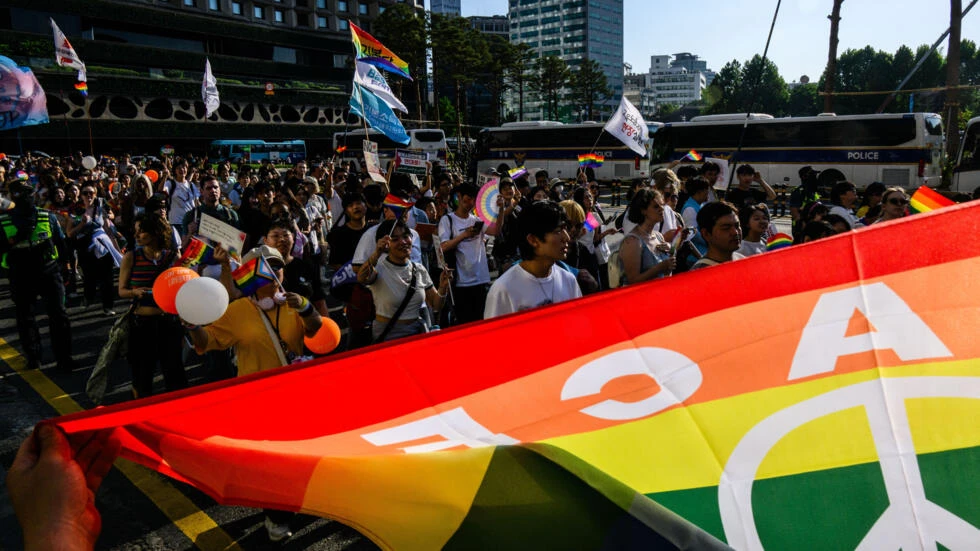Tens of thousands of South Koreans celebrate Pride despite backlash

Stay tuned with 24 News HD Android App

Tens of thousands of LGBTQ South Koreans and their supporters gathered in central Seoul for annual Pride celebrations Saturday, despite authorities blocking the event from being held at its traditional venue for the second consecutive year.
Same-sex marriage remains unrecognised in Asia's fourth largest economy, and activists have long emphasised the need for legislation outlawing discrimination on the basis of sexual orientation.
This year's Pride Parade, marking its 25th anniversary and one of the largest in Asia, was denied permission to gather at the Seoul Plaza in front of City Hall, where the main festivities were previously held.
Seoul's conservative mayor Oh Se-hoon has said he "personally can't agree with homosexuality", but municipal authorities blamed a scheduling conflict and said the venue had already been reserved for another event.
Pride festivities instead took place in the streets in central Seoul, with companies and organisations including IKEA and Amnesty International, as well as the US embassy, participating to show support.
Areas surrounding Seoul's major thoroughfares Namdaemun-ro and Ujeongguk-ro were packed with excited participants wearing rainbow-themed costumes and make-up, some blowing bubbles and many waving orange balloons -- the theme colour for this year's edition.
"The colour orange symbolises an intermediary quality between red and yellow. It doesn't belong anywhere but exists independently... akin to our queer way of being," Pride organisers said in a statement.
According to organisers, authorities said three other venues managed by the Seoul city government, including the Seoul Museum of History, also could not be used for side events because they may cause "social conflict".
The city's decision was "nonsensical", but it does not diminish the pride that LGBTQ people feel for the annual event, participant Na Joo-youn told AFP.
"I'm openly queer, which means I often have to fight for what I believe, which sometimes makes it hard to live as myself," Na, 26, said.
"Today, I get to enjoy being myself. Those who oppose the Pride Parade have been around for a long time, but whatever they do or say, they cannot erase our existence."
While many LGBTQ people in South Korea still live in the closet, 28-year-old Im So-oa said those who came out for Pride -- dressed up and showing off their outfits -- were "freely expressing themselves".
"I wish for a world where this could continue 365 days a year," Im said.
Rights 'regressing'
Nearly a quarter of South Korea's 52 million population is Christian and churches remain a significant political arena, particularly for legislators.
LGBTQ festivals have often been targeted by evangelical Christian groups, who have thrown water bottles, verbally abused Pride marchers and tried to block their route by lying down in the street.
Just a few hundred metres away from the main streets where the festival was held on Saturday, Christian protesters denounced LGBTQ rights, holding signs that read "No!! Same-sex Marriage" and "The country built with blood and sweat is collapsing due to homosexuality."
"We're opposing homosexuality because we want those who think they are 'homosexuals' to be truly happy by accepting God's ways, which only permit the union of a man and a woman," Jang Mi-young, a 65-year-old Christian protester, told AFP.
In addition to the festival facing difficulties in securing venues, attempts to pass laws banning discrimination on the basis of sexuality have languished since around 2007, with lawmakers coming under pressure from conservative and religious organisations.
"It would not be an exaggeration to say that the human rights of sexual minorities in South Korean society are regressing, (rather than meeting) the global standards," said one of the festival's organisers, who goes by Hyeonju.
This year's festival included a group of South Korean queers protesting against Israel's offensive in Gaza.
Waving the Palestinian flag and banners that read "From the river to the sea, Palestine will be free", they accused Israel of "pink-washing", or boasting of its acceptance of the LGBTQ community to cover up rights abuses against Palestinians.
"As the saying 'LGBTQ is everywhere' is not just a rhetorical statement but contains literal truth, many sexual minorities are living, getting hurt, and dying in Palestine, where a genocide is being committed," they said in a statement.
"Queers living in South Korea deeply wish for the survival and liberation of Palestinian queers."
